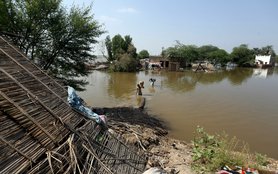As the conflict in Ukraine precipitates a dramatic new energy crisis, it would make sense for the world to examine its relationship to and reliance on fossil fuels—and take serious steps to transition away from them. A new report underscores the practical and moral imperative to lead the way to new solutions. Why is the US hesitating?
Any serious effort to tackle the climate crisis involves phasing out fossil fuels and addressing the increasing inequality of global emissions. The UN just released another scientific report that issues one more wake up call to rapidly cut emissions by immediately phasing out fossil fuels and switching to renewable energy.
But is the US heeding that call? While the Biden administration has promised federal action to drive the clean energy transition, the truth is that it continues to pursue policies that expand fossil fuel dependency and harm communities.
In just one example: Days after committing to reduce US methane emissions at COP26 (26th UN Climate Change Conference), the administration led one of the largest sales of federal land for oil and gas development. Though there are plans to drastically cut carbon and promote environmental justice, the historic Investment Infrastructure and Jobs Act directs billions of public dollars to develop gas and other alternatives contested by communities experiencing the worst impacts of climate change; these communities are disproportionately Black, Indigenous, low-income, and of color.
Now, as we experience the biggest global energy crisis since the 1970s, the administration is expanding fossil fuel infrastructure, enabling increased corporate profits while locking in massive emissions and devastating generational impacts on the climate and humanity.
A crisis puts the Paris Goals on life support
The conflict in Ukraine has increased energy costs and the volatility of markets still recovering from COVID-19. In response, President Biden announced oil releases from the Strategic Reserve at a level not seen in 50 years, and more domestic production over at least the next two years.
The US also announced a new partnership to increase liquified natural gas (LNG) imports to Europe, which currently relies on Russia for more than a third of its gas supply. The partnership is prompting new infrastructure that will give the US the largest global capacity for LNG by the end of this year. Forecasts for Texas’ production alone is more than any other country in the world.
Increasing fossil fuel dependency is out of step with actions needed in the most critical decade for mitigating emissions.
In fact, the world has such a narrow window to keep warming to under 1.5 Celsius that the UN Secretary General called this push for LNG by the US and other countries a strategy of “mutually assured destruction” that has put the goals of the Paris Climate Agreement “on life support.”
The consequences will not be felt equally
Black, Indigenous, low-income, and communities of color, especially women and girls within these communities, already disproportionately bear the social costs of fossil fuel use. They will increasingly do so under US policies.
Gas production and use releases methane, a pollutant 80 times more potent at trapping heat than CO2 and responsible for at least 30 percent of global temperature rise. These pollutants cause asthma, lung disease, cancer, and even premature death--social costs estimated at $8.1 billion in 2019 and expected to grow to $30.5 billion annually by 2030.
The overwhelming majority of new and expanding gas facilities are sited in Louisiana and Texas--already home to half the country's oil refineries, gas processing and petrochemical facilities, and their corresponding pollution. Expanding LNG capacity here ignores the social costs already borne by nearby communities of color.
These facilities are also being built in areas prone to hurricanes and flooding, and on wetlands critical for coastal protection from disasters. As climate change increases the frequency and intensity of extreme weather events, such facilities increase the vulnerability of Gulf residents, making it harder for them to adapt.
Moreover, expanding US fossil fuel infrastructure perpetuates historical inequities against the Global South, which has contributed the least to climate change. More than three billion people already live in areas highly vulnerable to climate change and would be at increased risk from climate impacts spurred by rising US emissions. And, by capturing more of the shrinking carbon budget, the US infringes on the ability of Global South countries to develop their natural resources.
From pledges to action
Just last year, the Biden Administration committed to achieving net zero emissions by 2050, but getting there will not be possible if the US continues its current path. As an historic and persistent top emitter, the US has a key role and a moral obligation to address the injustice and inequality at the heart of the climate crisis
The takeaway from the IPCC report is clear: the US must stop promoting the expansion of dirty energy and instead take action to phase out fossil fuels, including by ending subsidies to fossil fuel companies and increasing investments in renewable energy development. At a minimum, the US must also center communities of color in policy, and respect Indigenous communities’ rights to Free, Prior, and Informed Consent.
Anything less will continue to derail a fair and just energy transition vital to tackling the climate emergency.
Check out the new IPCC report.



